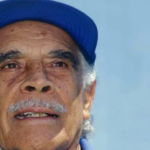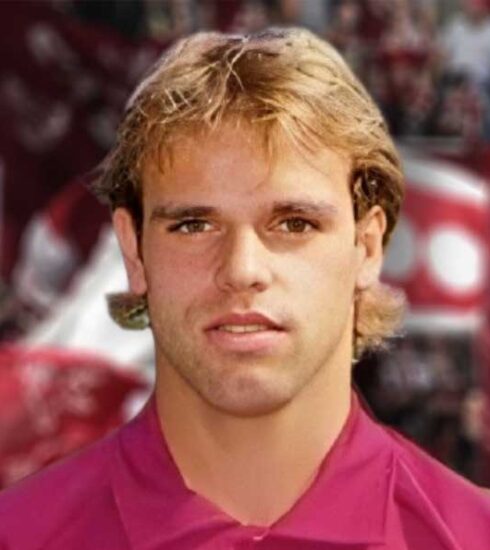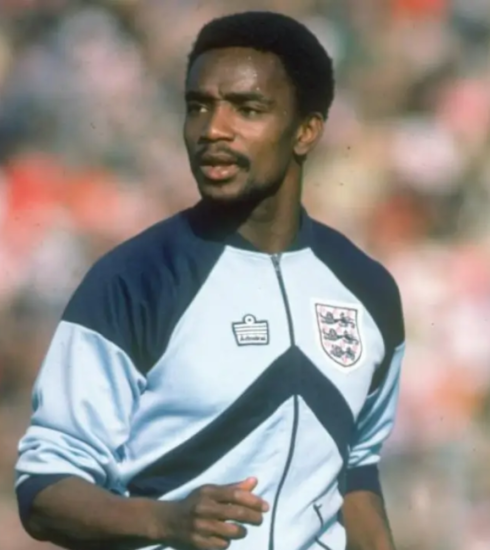IGNACIO ‘NACHO’ TRELLES: An unknown legend



Probably only those who are Mexican and have perhaps already entered the ‘old age’ have heard of Don Ignacio Trelles.
Yet we are talking about the greatest Mexican coach of all time and the one who holds virtually all the most important records in his country’s football history.
‘Nacho’ Trelles was born in Guadalajara in July 1916 and played all sorts of sports as a child.
Athletics and basketball in particular.
All except football.
At the end of the Mexican Revolution, the Trelles family decides to leave Guadalajara and move to Mexico City, in the barrio of San Miguel Chapultepec.
On the way, the train with the Trelles family has to make a stop just before Mexico City. Next to the station is a small football field, with two small wooden goals and a group of kids playing.
‘I was simply thunderstruck,’ Trelles himself recounts of that episode.
“Seeing kids my age doing things with their feet that in basketball already seemed difficult with their hands, such as driving the ball or changing direction abruptly, fascinated me so much. I had never seen the sport in Guadalajara. As soon as we arrived in Mexico City, my first concern was to find a football field and guys to play futbol. Luckily for me, I realised that everyone in Mexico City played football,’ Don Nacho recalls.
His life from that moment on will be inextricably linked to football.
At the age of 18, he was already a starter in Necaxa and with ‘Los Electricistas’ he would win three titles in his six years with the club.
He is an elegant midfielder, with great vision and remarkable quickness, which more than compensate for a less than powerful physique.
His performances attracted the attentions of the most popular Mexican club, America, where he played three seasons without, however, managing to win the La Liga title.
After a brief spell at Monterrey and one in the United States with the Chicago Vikings, Trelles returned to his homeland in 1948 with Atlante, Necaxa’s great historical rivals.
Here, after a handful of games, came a serious injury (fractured tibia and fibula) that would effectively end his career.
“In my plans was to play at least until I was 40. Instead, at 32 I was finished as a footballer,’ Trelles has always admitted.
The lifeline after ‘the two saddest and most difficult years of my life’ came in 1950. The small Mexican Second Division club Zacatepec offered him the role of coach.
It will be one of the greatest insights in the entire history of Mexican football.
Trelles’ impact on the ‘Cañeros’ bench is sensational.
Zacatepec immediately won the title and returned to the top flight.
In the first match of the season, the calendar pits Zacatepec against Veracruz.
Trelles’ boys won by eight goals to nil, giving a wonderful display of offensive football, which was to become Don Nacho’s trademark.
Soon his name began to circulate among the big boys of the Mexican league, but Nacho, to the general surprise, signed for Marte Futbol Club (a team that unfortunately disappeared from the Mexican football scene).
It will once again be an apt choice as Marte will win the title in the 1953-1954 season.
But the call of the team that had launched him a few years earlier as a coach is irresistible for Nacho.
Macho Trelles returned to Zacatepec. The joy of the fans and managers at the announcement of his return is not even comparable to what they will feel less than a year later.
Zacatepec will win the title, the first team from the Morelos region to triumph in the top division.
… that party will be talked about for years, as ‘traces’ will remain forever in the region’s registry office given the birth boom the following year!
For ‘Los Cañeros’ these are golden years that will prove to be unrepeatable in the history of this small club.
Three years later, at the end of the 1957-1958 season, in fact, Trelles and his boys repeated the feat: a new title, this time in front of the mighty Toluca.
At the end of that season came the call from the national team.
First as assistant to coach Antonio Lopez Herranz and shortly afterwards as first manager of the ‘Tricolore’.
From that moment on, a long period began for Trelles, where he alternated between leading the major national team and the club team, as was quietly permitted at the time.
As a natural consequence, it was America that secured Trelles’ performance, although with him on the bench they never went beyond second place in the championship.
Instead, the results on the national team bench were very flattering.
The Mexican national team qualifies for the 1962 World Cup in Chile. It is Mexico’s fifth participation in the final phase of a World Cup … only no victory has ever come until then.
Trelles will be the first coach to succeed in this feat. It happened on 7 June 1962, when the Mexicans won by three goals to one against the very strong Czechoslovakia, which in that edition of the World Cup would even reach the final, contending with Brazil of Pelé, Garrincha and Zagallo for the title.
He would remain on the Mexico bench for the following World Cup, those of England in 1966 at the end of which he would go on to coach Toluca, where he would win two titles in the space of three seasons.
In 1968 at the Mexico City Olympics, he was again in charge of the Mexican national team at the games.
Things did not go as hoped by all the Mexican people.
In the semifinals, the ‘Tricolour’ had to concede three goals to two against Bulgaria before losing the bronze medal in the final against Japan under bomber Kunishighe Kamamoto.
In Mexico the disappointment was enormous and the discontent and intemperance of the fans cast a heavy shadow over Trelles and his hitherto almost perfect career.
What happened in these Olympics would prove decisive in the Mexican Federation’s decision to entrust the running of the team to a new coach, Raul Cardenas, who had just led his Cruz Azul to the title.
Having closed (for the moment) the national chapter, Don Nacho plunged back into club life but the results, for the first time in his career, did not live up to expectations.
Not in the last years with Toluca (until 1972) nor in the following three seasons in Puebla.
In 1976 he took the bench at Cruz Azul. A couple of seasons to rebuild the team and in 1979 came the title, repeated the following season.
These were to be his last national titles, to which he would add the last trophy of his amazing career in 1983, that of the CONCACAF Champions Cup won with Atlante.
His last bench will be with Puebla.
It is 15 June 1991, just over a month before his 75th birthday.
The semi-final of the Mexican championship is being played.
His Puebla team will lose by one goal to zero against the Pumas de la UNAM, who will qualify for the final.
Don Nacho Trelles will always remain a football lover, until the last days of his life.
The greatest coach in the history of Mexican football will die on 24 March 2020, at the age of 103.

ANECDOTES AND CURIOSITIES
Ignacio Trelles only began playing futbol seriously at the age of thirteen, after moving from Guadalajara to Mexico City.
“But I made up for it quickly, as I played it twice as long as my teammates at the time, so I made up for lost time quickly,” Trelles recounts with amusement.
‘El flaco’ was one of his nicknames given his petite physique, but the one by which Trelles is best known is ‘cachuchas’, for the classic cap he wore practically all the time. (The origin apparently came from a group of students who, inspired by Mexican national socialism, wore this headgear as a distinctive sign).
His first salary in Necaxa was the ten pesos he received in case of victory to which he added free tickets to watch the ‘corrida’, of which Trelles became a great fan.
One of Don Nacho’s characteristics was the great balance he showed on the pitch.
“I’m not one of those coaches who, if they take a goal in the 90th minute, seem to want to commit suicide. It happened to me on a very special occasion. We were at the World Cup in Chile and we were drawing against the very strong Spanish national team. In the last minute there was a corner kick for us. I dreamed of the goal that would make football history in my country. Instead, there was a clearance, Gento took the ball outside the box, ran all over the pitch and scored the winning goal for the Spaniards’, adding ‘the only time I cried in my life was for the death of my mother. Football, although I love it, has never been so important’.
The injury that cut his career short occurred in one of the very first games he played with Atlas on his return from the United States (some texts even say it happened in his very first game with the new club).
“What broke my tibia and fibula was Angel Leon, known as ‘El Pulques’, who was my goalkeeper at Necaxa. Unfortunately surgery in those days was what it was. I never fully recovered and my right leg has been ‘twisted’ ever since.
After the Mexican Olympics, which ended with a disappointing fourth place, Trelles’ position at the helm of the national team for the upcoming World Cup in Mexico 1970 was, as mentioned, strongly questioned, although there are many sources that believe that it was Trelles himself who refused the bench of the Mexican national team for the World Cup precisely because of the pressure and exaggerated stress he and his family would have been subjected to.
One of his biggest regrets, by his own admission, was that he never had the chance to coach Chivas de Guadalajara, one of the most important and beloved clubs in the country.
‘There was never any contact in my more than 40-year career. To coach the ‘Rebaño Sagrado’ is something I miss … but if it didn’t happen it must have been that way,’ Trelles has always admitted philosophically.
Finally, some numbers that more than anything else can define Don Nacho’s importance and prowess.
Coach with most titles won in the history of Mexican football (7)
Mexican coach with most trophies won in his career (15)
Sharing with Victor Manuel Vuchetic the only one to win a title with 4 different teams
Coach with most appearances on the bench of the Mexican national team (117)
First coach to win a match in a World Cup final (against Czechoslovakia in 1962).
First coach to win a point during a World Cup final phase (draw against Wales in 1958 in Sweden)
Second coach with most appearances on a bench in the Mexican First Division. (1083)







